Examining Welfare Laws for Mentally Ill: A Legal Perspective
VerifiedAdded on 2023/05/31
|8
|1883
|315
Essay
AI Summary
This essay explores the role of welfare laws in supporting individuals with mental illness, highlighting the importance of government support in ensuring minimum standards of quality life. It discusses the impact of mental illness on individuals, families, and society, emphasizing the need for comprehensive mental health legislation. The essay examines various legal frameworks, including those in Australia, India, Scotland, and Japan, to illustrate different approaches to protecting the rights and meeting the needs of the mentally ill. It also addresses the challenges faced by the mentally ill, such as stigmatization and lack of insight, and emphasizes the importance of integrating them into society through employment, housing, and healthcare. The essay concludes by discussing the role of social security programs in improving income support for low-income earners with mental illness, while also acknowledging criticisms and the need for better policies. Desklib offers a wealth of resources, including similar essays and solved assignments, for students seeking to deepen their understanding of welfare laws and mental health.
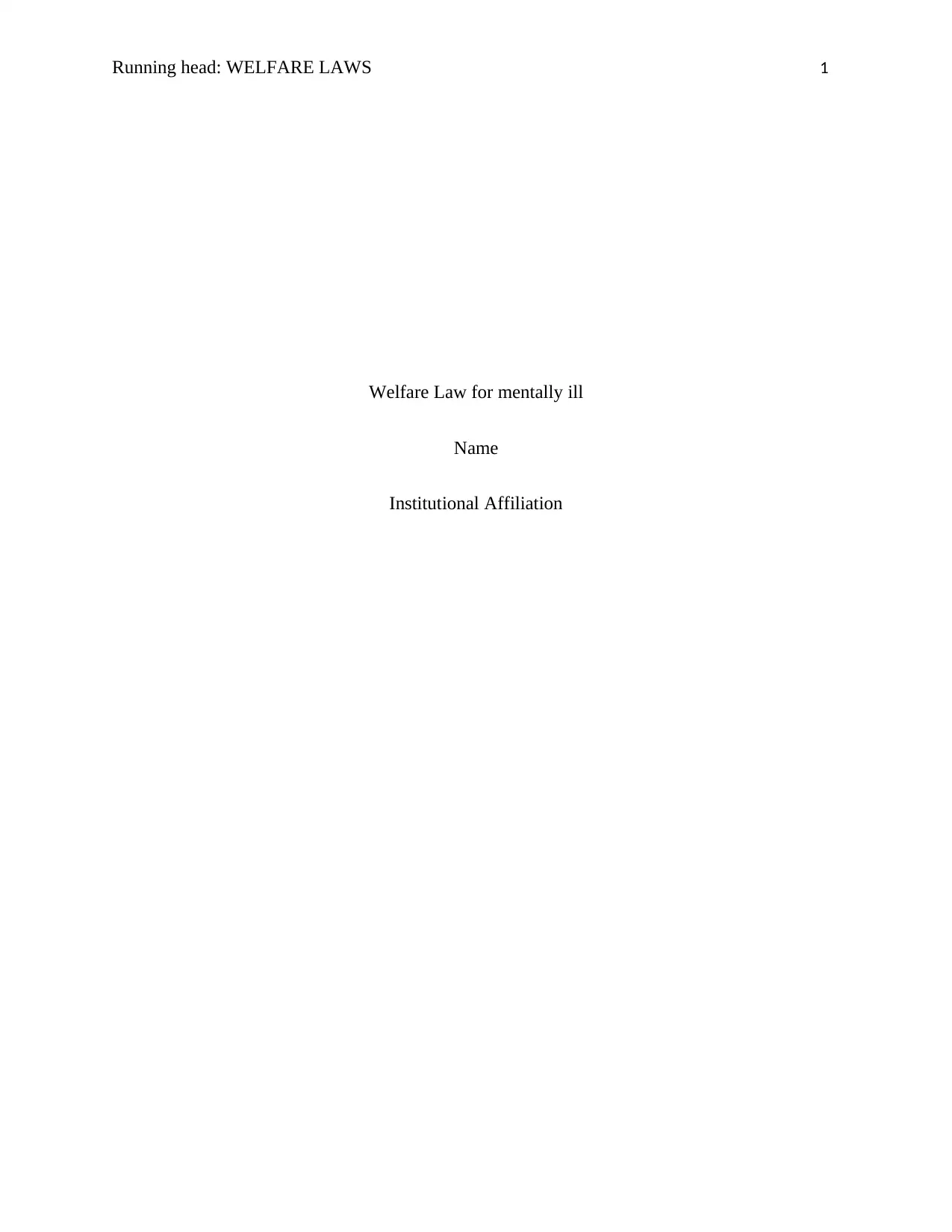
Running head: WELFARE LAWS 1
Welfare Law for mentally ill
Name
Institutional Affiliation
Welfare Law for mentally ill
Name
Institutional Affiliation
Paraphrase This Document
Need a fresh take? Get an instant paraphrase of this document with our AI Paraphraser
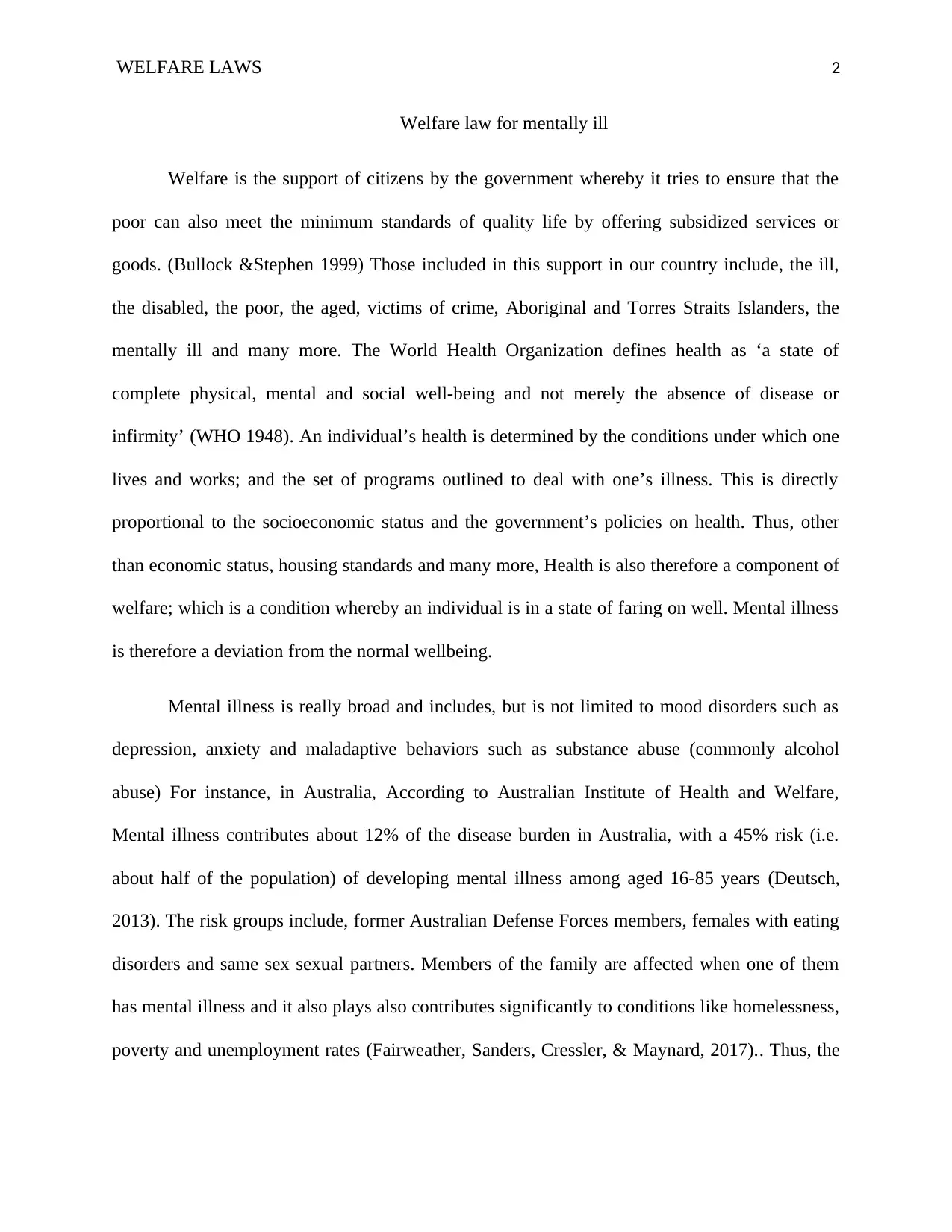
WELFARE LAWS 2
Welfare law for mentally ill
Welfare is the support of citizens by the government whereby it tries to ensure that the
poor can also meet the minimum standards of quality life by offering subsidized services or
goods. (Bullock &Stephen 1999) Those included in this support in our country include, the ill,
the disabled, the poor, the aged, victims of crime, Aboriginal and Torres Straits Islanders, the
mentally ill and many more. The World Health Organization defines health as ‘a state of
complete physical, mental and social well-being and not merely the absence of disease or
infirmity’ (WHO 1948). An individual’s health is determined by the conditions under which one
lives and works; and the set of programs outlined to deal with one’s illness. This is directly
proportional to the socioeconomic status and the government’s policies on health. Thus, other
than economic status, housing standards and many more, Health is also therefore a component of
welfare; which is a condition whereby an individual is in a state of faring on well. Mental illness
is therefore a deviation from the normal wellbeing.
Mental illness is really broad and includes, but is not limited to mood disorders such as
depression, anxiety and maladaptive behaviors such as substance abuse (commonly alcohol
abuse) For instance, in Australia, According to Australian Institute of Health and Welfare,
Mental illness contributes about 12% of the disease burden in Australia, with a 45% risk (i.e.
about half of the population) of developing mental illness among aged 16-85 years (Deutsch,
2013). The risk groups include, former Australian Defense Forces members, females with eating
disorders and same sex sexual partners. Members of the family are affected when one of them
has mental illness and it also plays also contributes significantly to conditions like homelessness,
poverty and unemployment rates (Fairweather, Sanders, Cressler, & Maynard, 2017).. Thus, the
Welfare law for mentally ill
Welfare is the support of citizens by the government whereby it tries to ensure that the
poor can also meet the minimum standards of quality life by offering subsidized services or
goods. (Bullock &Stephen 1999) Those included in this support in our country include, the ill,
the disabled, the poor, the aged, victims of crime, Aboriginal and Torres Straits Islanders, the
mentally ill and many more. The World Health Organization defines health as ‘a state of
complete physical, mental and social well-being and not merely the absence of disease or
infirmity’ (WHO 1948). An individual’s health is determined by the conditions under which one
lives and works; and the set of programs outlined to deal with one’s illness. This is directly
proportional to the socioeconomic status and the government’s policies on health. Thus, other
than economic status, housing standards and many more, Health is also therefore a component of
welfare; which is a condition whereby an individual is in a state of faring on well. Mental illness
is therefore a deviation from the normal wellbeing.
Mental illness is really broad and includes, but is not limited to mood disorders such as
depression, anxiety and maladaptive behaviors such as substance abuse (commonly alcohol
abuse) For instance, in Australia, According to Australian Institute of Health and Welfare,
Mental illness contributes about 12% of the disease burden in Australia, with a 45% risk (i.e.
about half of the population) of developing mental illness among aged 16-85 years (Deutsch,
2013). The risk groups include, former Australian Defense Forces members, females with eating
disorders and same sex sexual partners. Members of the family are affected when one of them
has mental illness and it also plays also contributes significantly to conditions like homelessness,
poverty and unemployment rates (Fairweather, Sanders, Cressler, & Maynard, 2017).. Thus, the
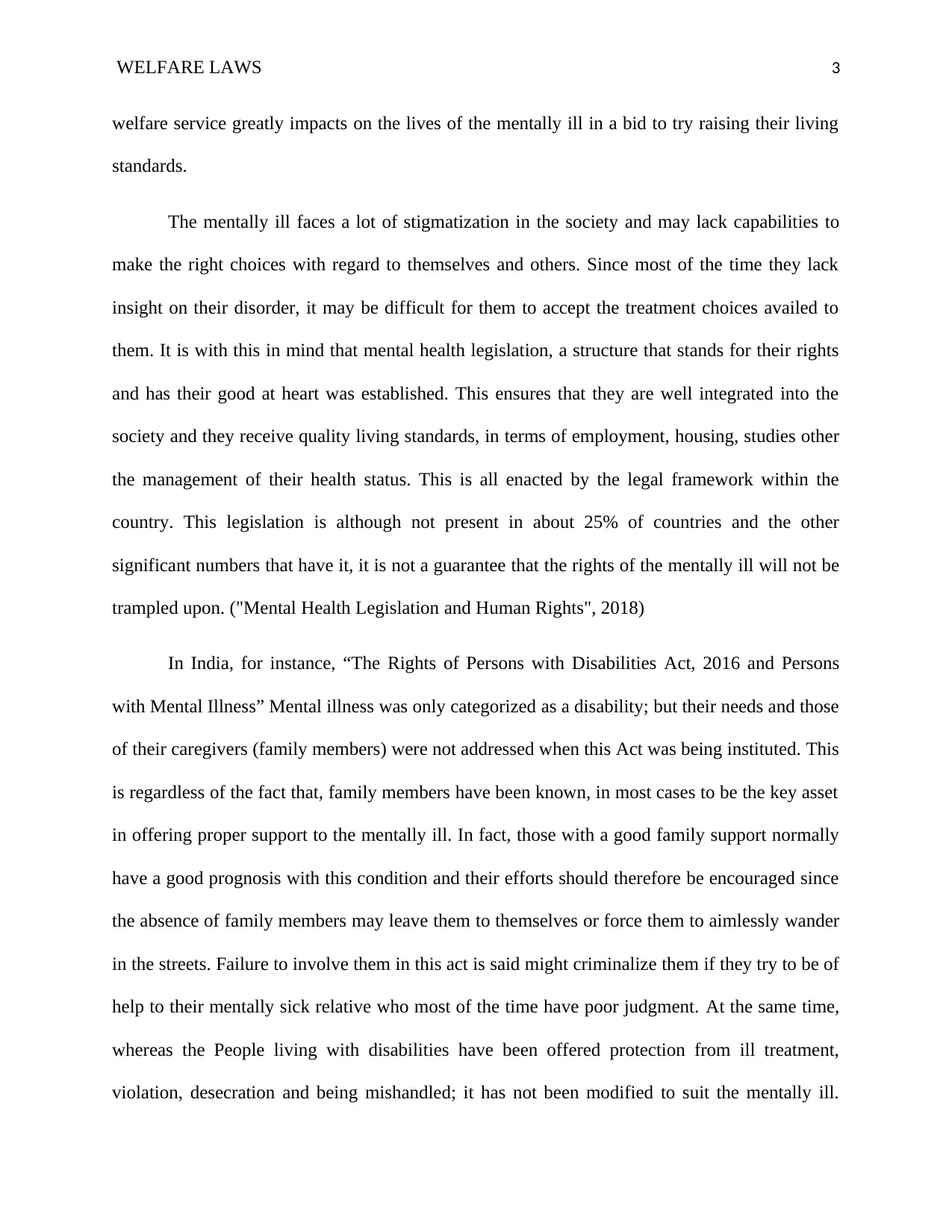
WELFARE LAWS 3
welfare service greatly impacts on the lives of the mentally ill in a bid to try raising their living
standards.
The mentally ill faces a lot of stigmatization in the society and may lack capabilities to
make the right choices with regard to themselves and others. Since most of the time they lack
insight on their disorder, it may be difficult for them to accept the treatment choices availed to
them. It is with this in mind that mental health legislation, a structure that stands for their rights
and has their good at heart was established. This ensures that they are well integrated into the
society and they receive quality living standards, in terms of employment, housing, studies other
the management of their health status. This is all enacted by the legal framework within the
country. This legislation is although not present in about 25% of countries and the other
significant numbers that have it, it is not a guarantee that the rights of the mentally ill will not be
trampled upon. ("Mental Health Legislation and Human Rights", 2018)
In India, for instance, “The Rights of Persons with Disabilities Act, 2016 and Persons
with Mental Illness” Mental illness was only categorized as a disability; but their needs and those
of their caregivers (family members) were not addressed when this Act was being instituted. This
is regardless of the fact that, family members have been known, in most cases to be the key asset
in offering proper support to the mentally ill. In fact, those with a good family support normally
have a good prognosis with this condition and their efforts should therefore be encouraged since
the absence of family members may leave them to themselves or force them to aimlessly wander
in the streets. Failure to involve them in this act is said might criminalize them if they try to be of
help to their mentally sick relative who most of the time have poor judgment. At the same time,
whereas the People living with disabilities have been offered protection from ill treatment,
violation, desecration and being mishandled; it has not been modified to suit the mentally ill.
welfare service greatly impacts on the lives of the mentally ill in a bid to try raising their living
standards.
The mentally ill faces a lot of stigmatization in the society and may lack capabilities to
make the right choices with regard to themselves and others. Since most of the time they lack
insight on their disorder, it may be difficult for them to accept the treatment choices availed to
them. It is with this in mind that mental health legislation, a structure that stands for their rights
and has their good at heart was established. This ensures that they are well integrated into the
society and they receive quality living standards, in terms of employment, housing, studies other
the management of their health status. This is all enacted by the legal framework within the
country. This legislation is although not present in about 25% of countries and the other
significant numbers that have it, it is not a guarantee that the rights of the mentally ill will not be
trampled upon. ("Mental Health Legislation and Human Rights", 2018)
In India, for instance, “The Rights of Persons with Disabilities Act, 2016 and Persons
with Mental Illness” Mental illness was only categorized as a disability; but their needs and those
of their caregivers (family members) were not addressed when this Act was being instituted. This
is regardless of the fact that, family members have been known, in most cases to be the key asset
in offering proper support to the mentally ill. In fact, those with a good family support normally
have a good prognosis with this condition and their efforts should therefore be encouraged since
the absence of family members may leave them to themselves or force them to aimlessly wander
in the streets. Failure to involve them in this act is said might criminalize them if they try to be of
help to their mentally sick relative who most of the time have poor judgment. At the same time,
whereas the People living with disabilities have been offered protection from ill treatment,
violation, desecration and being mishandled; it has not been modified to suit the mentally ill.
⊘ This is a preview!⊘
Do you want full access?
Subscribe today to unlock all pages.

Trusted by 1+ million students worldwide
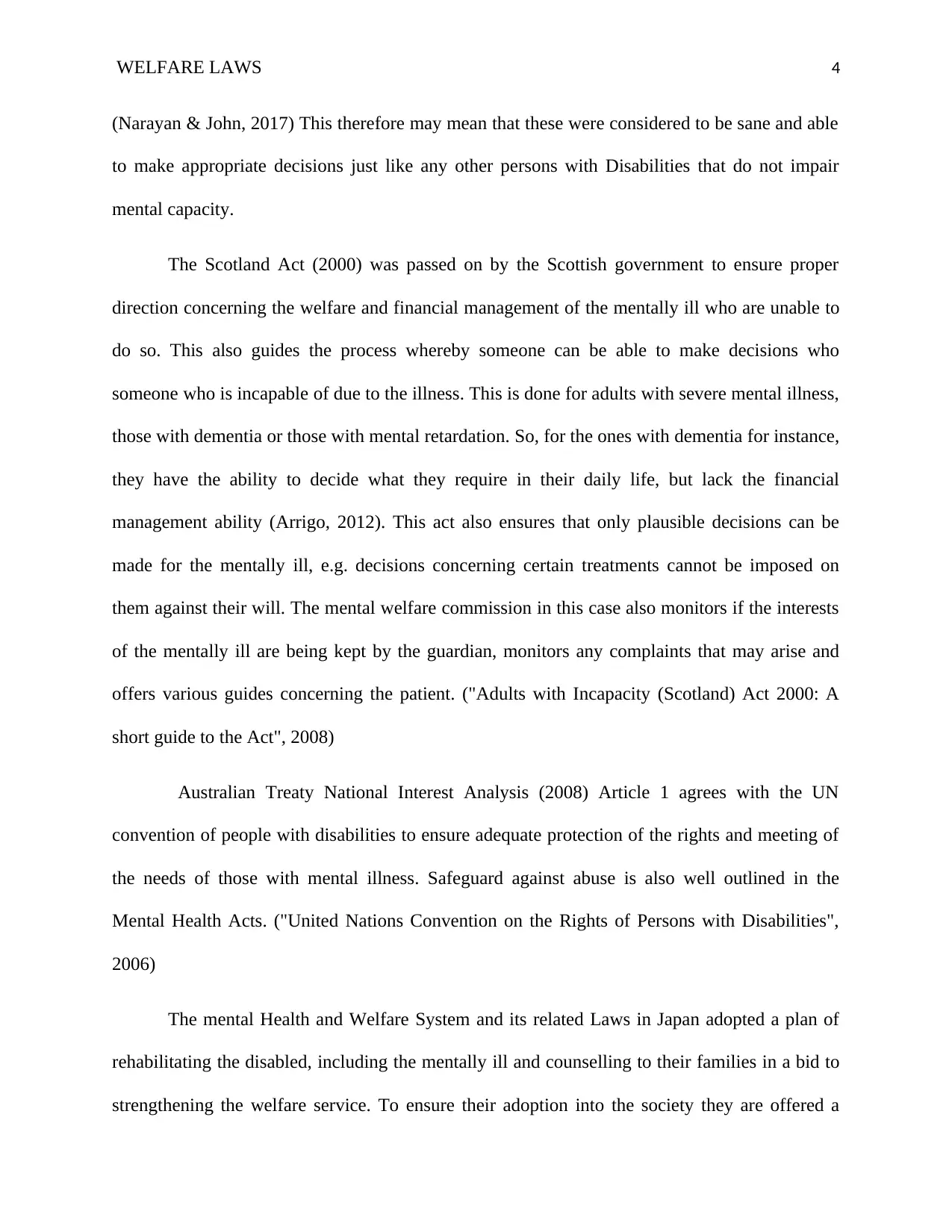
WELFARE LAWS 4
(Narayan & John, 2017) This therefore may mean that these were considered to be sane and able
to make appropriate decisions just like any other persons with Disabilities that do not impair
mental capacity.
The Scotland Act (2000) was passed on by the Scottish government to ensure proper
direction concerning the welfare and financial management of the mentally ill who are unable to
do so. This also guides the process whereby someone can be able to make decisions who
someone who is incapable of due to the illness. This is done for adults with severe mental illness,
those with dementia or those with mental retardation. So, for the ones with dementia for instance,
they have the ability to decide what they require in their daily life, but lack the financial
management ability (Arrigo, 2012). This act also ensures that only plausible decisions can be
made for the mentally ill, e.g. decisions concerning certain treatments cannot be imposed on
them against their will. The mental welfare commission in this case also monitors if the interests
of the mentally ill are being kept by the guardian, monitors any complaints that may arise and
offers various guides concerning the patient. ("Adults with Incapacity (Scotland) Act 2000: A
short guide to the Act", 2008)
Australian Treaty National Interest Analysis (2008) Article 1 agrees with the UN
convention of people with disabilities to ensure adequate protection of the rights and meeting of
the needs of those with mental illness. Safeguard against abuse is also well outlined in the
Mental Health Acts. ("United Nations Convention on the Rights of Persons with Disabilities",
2006)
The mental Health and Welfare System and its related Laws in Japan adopted a plan of
rehabilitating the disabled, including the mentally ill and counselling to their families in a bid to
strengthening the welfare service. To ensure their adoption into the society they are offered a
(Narayan & John, 2017) This therefore may mean that these were considered to be sane and able
to make appropriate decisions just like any other persons with Disabilities that do not impair
mental capacity.
The Scotland Act (2000) was passed on by the Scottish government to ensure proper
direction concerning the welfare and financial management of the mentally ill who are unable to
do so. This also guides the process whereby someone can be able to make decisions who
someone who is incapable of due to the illness. This is done for adults with severe mental illness,
those with dementia or those with mental retardation. So, for the ones with dementia for instance,
they have the ability to decide what they require in their daily life, but lack the financial
management ability (Arrigo, 2012). This act also ensures that only plausible decisions can be
made for the mentally ill, e.g. decisions concerning certain treatments cannot be imposed on
them against their will. The mental welfare commission in this case also monitors if the interests
of the mentally ill are being kept by the guardian, monitors any complaints that may arise and
offers various guides concerning the patient. ("Adults with Incapacity (Scotland) Act 2000: A
short guide to the Act", 2008)
Australian Treaty National Interest Analysis (2008) Article 1 agrees with the UN
convention of people with disabilities to ensure adequate protection of the rights and meeting of
the needs of those with mental illness. Safeguard against abuse is also well outlined in the
Mental Health Acts. ("United Nations Convention on the Rights of Persons with Disabilities",
2006)
The mental Health and Welfare System and its related Laws in Japan adopted a plan of
rehabilitating the disabled, including the mentally ill and counselling to their families in a bid to
strengthening the welfare service. To ensure their adoption into the society they are offered a
Paraphrase This Document
Need a fresh take? Get an instant paraphrase of this document with our AI Paraphraser
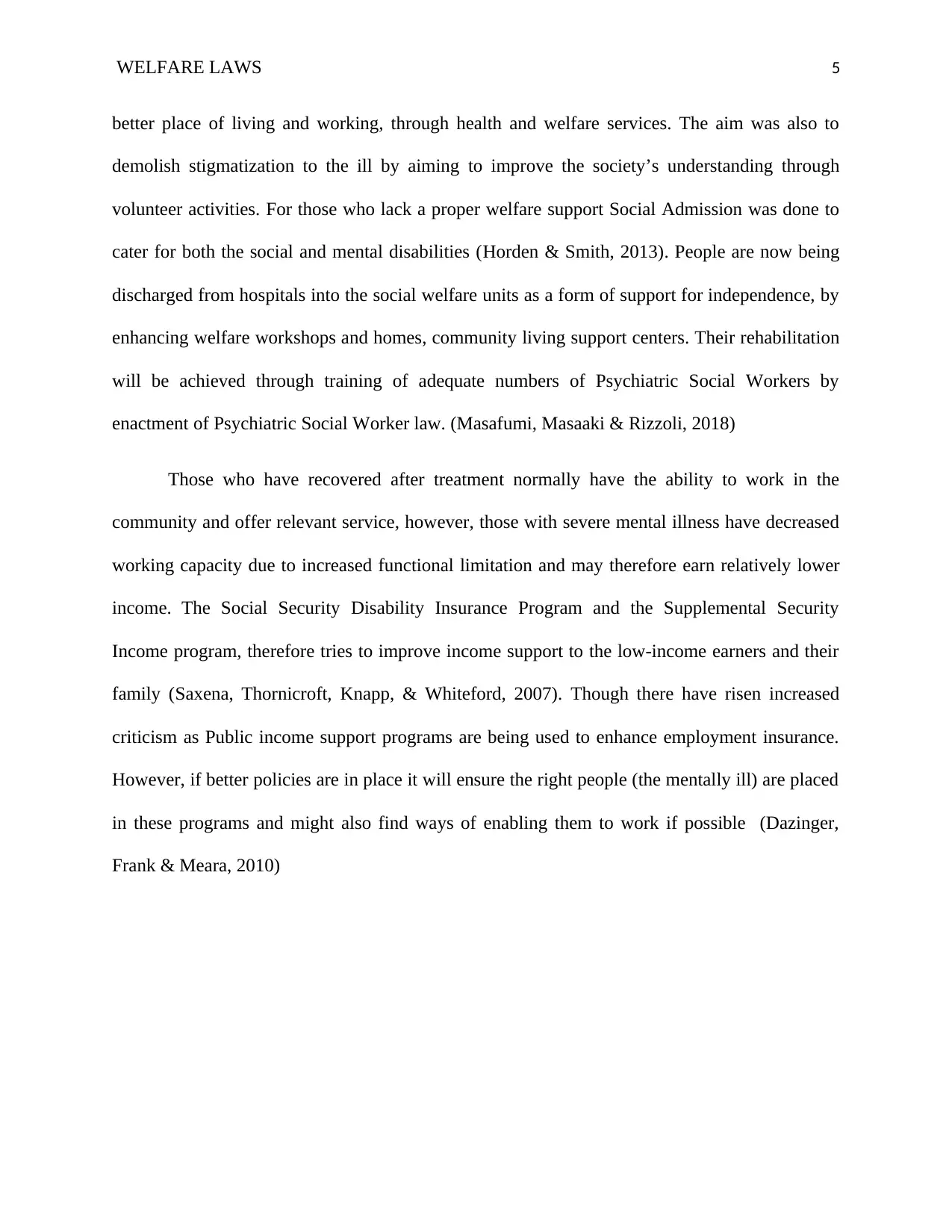
WELFARE LAWS 5
better place of living and working, through health and welfare services. The aim was also to
demolish stigmatization to the ill by aiming to improve the society’s understanding through
volunteer activities. For those who lack a proper welfare support Social Admission was done to
cater for both the social and mental disabilities (Horden & Smith, 2013). People are now being
discharged from hospitals into the social welfare units as a form of support for independence, by
enhancing welfare workshops and homes, community living support centers. Their rehabilitation
will be achieved through training of adequate numbers of Psychiatric Social Workers by
enactment of Psychiatric Social Worker law. (Masafumi, Masaaki & Rizzoli, 2018)
Those who have recovered after treatment normally have the ability to work in the
community and offer relevant service, however, those with severe mental illness have decreased
working capacity due to increased functional limitation and may therefore earn relatively lower
income. The Social Security Disability Insurance Program and the Supplemental Security
Income program, therefore tries to improve income support to the low-income earners and their
family (Saxena, Thornicroft, Knapp, & Whiteford, 2007). Though there have risen increased
criticism as Public income support programs are being used to enhance employment insurance.
However, if better policies are in place it will ensure the right people (the mentally ill) are placed
in these programs and might also find ways of enabling them to work if possible (Dazinger,
Frank & Meara, 2010)
better place of living and working, through health and welfare services. The aim was also to
demolish stigmatization to the ill by aiming to improve the society’s understanding through
volunteer activities. For those who lack a proper welfare support Social Admission was done to
cater for both the social and mental disabilities (Horden & Smith, 2013). People are now being
discharged from hospitals into the social welfare units as a form of support for independence, by
enhancing welfare workshops and homes, community living support centers. Their rehabilitation
will be achieved through training of adequate numbers of Psychiatric Social Workers by
enactment of Psychiatric Social Worker law. (Masafumi, Masaaki & Rizzoli, 2018)
Those who have recovered after treatment normally have the ability to work in the
community and offer relevant service, however, those with severe mental illness have decreased
working capacity due to increased functional limitation and may therefore earn relatively lower
income. The Social Security Disability Insurance Program and the Supplemental Security
Income program, therefore tries to improve income support to the low-income earners and their
family (Saxena, Thornicroft, Knapp, & Whiteford, 2007). Though there have risen increased
criticism as Public income support programs are being used to enhance employment insurance.
However, if better policies are in place it will ensure the right people (the mentally ill) are placed
in these programs and might also find ways of enabling them to work if possible (Dazinger,
Frank & Meara, 2010)
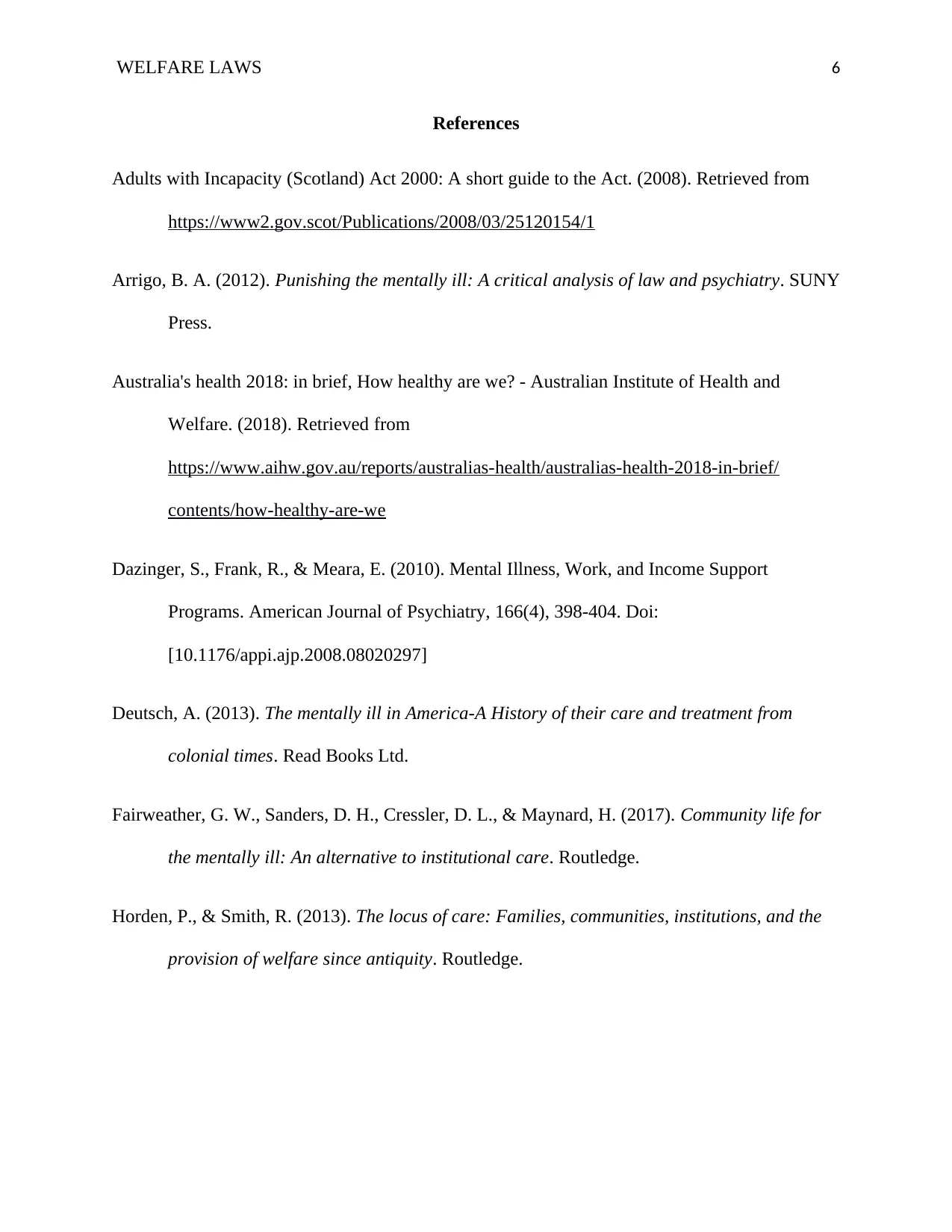
WELFARE LAWS 6
References
Adults with Incapacity (Scotland) Act 2000: A short guide to the Act. (2008). Retrieved from
https://www2.gov.scot/Publications/2008/03/25120154/1
Arrigo, B. A. (2012). Punishing the mentally ill: A critical analysis of law and psychiatry. SUNY
Press.
Australia's health 2018: in brief, How healthy are we? - Australian Institute of Health and
Welfare. (2018). Retrieved from
https://www.aihw.gov.au/reports/australias-health/australias-health-2018-in-brief/
contents/how-healthy-are-we
Dazinger, S., Frank, R., & Meara, E. (2010). Mental Illness, Work, and Income Support
Programs. American Journal of Psychiatry, 166(4), 398-404. Doi:
[10.1176/appi.ajp.2008.08020297]
Deutsch, A. (2013). The mentally ill in America-A History of their care and treatment from
colonial times. Read Books Ltd.
Fairweather, G. W., Sanders, D. H., Cressler, D. L., & Maynard, H. (2017). Community life for
the mentally ill: An alternative to institutional care. Routledge.
Horden, P., & Smith, R. (2013). The locus of care: Families, communities, institutions, and the
provision of welfare since antiquity. Routledge.
References
Adults with Incapacity (Scotland) Act 2000: A short guide to the Act. (2008). Retrieved from
https://www2.gov.scot/Publications/2008/03/25120154/1
Arrigo, B. A. (2012). Punishing the mentally ill: A critical analysis of law and psychiatry. SUNY
Press.
Australia's health 2018: in brief, How healthy are we? - Australian Institute of Health and
Welfare. (2018). Retrieved from
https://www.aihw.gov.au/reports/australias-health/australias-health-2018-in-brief/
contents/how-healthy-are-we
Dazinger, S., Frank, R., & Meara, E. (2010). Mental Illness, Work, and Income Support
Programs. American Journal of Psychiatry, 166(4), 398-404. Doi:
[10.1176/appi.ajp.2008.08020297]
Deutsch, A. (2013). The mentally ill in America-A History of their care and treatment from
colonial times. Read Books Ltd.
Fairweather, G. W., Sanders, D. H., Cressler, D. L., & Maynard, H. (2017). Community life for
the mentally ill: An alternative to institutional care. Routledge.
Horden, P., & Smith, R. (2013). The locus of care: Families, communities, institutions, and the
provision of welfare since antiquity. Routledge.
⊘ This is a preview!⊘
Do you want full access?
Subscribe today to unlock all pages.

Trusted by 1+ million students worldwide
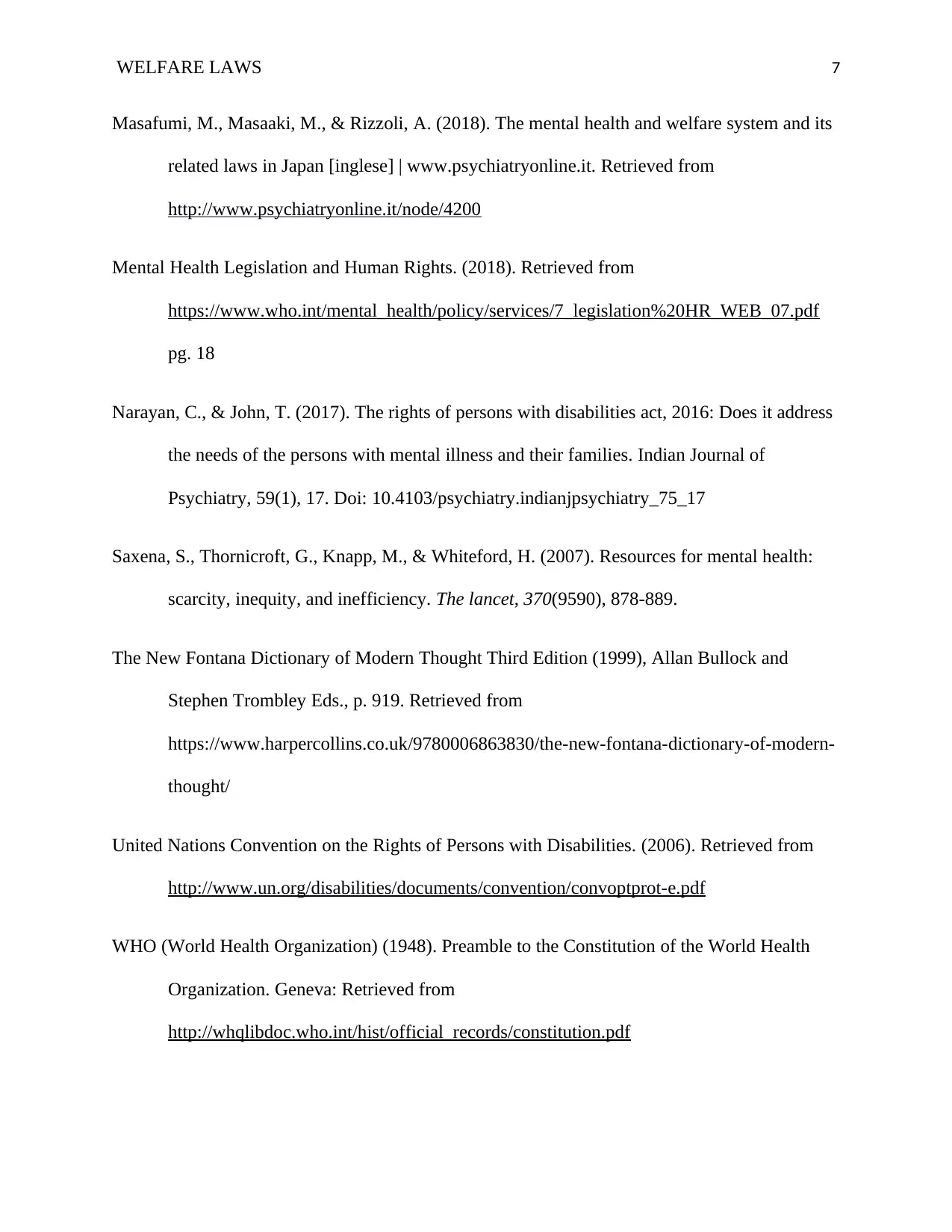
WELFARE LAWS 7
Masafumi, M., Masaaki, M., & Rizzoli, A. (2018). The mental health and welfare system and its
related laws in Japan [inglese] | www.psychiatryonline.it. Retrieved from
http://www.psychiatryonline.it/node/4200
Mental Health Legislation and Human Rights. (2018). Retrieved from
https://www.who.int/mental_health/policy/services/7_legislation%20HR_WEB_07.pdf
pg. 18
Narayan, C., & John, T. (2017). The rights of persons with disabilities act, 2016: Does it address
the needs of the persons with mental illness and their families. Indian Journal of
Psychiatry, 59(1), 17. Doi: 10.4103/psychiatry.indianjpsychiatry_75_17
Saxena, S., Thornicroft, G., Knapp, M., & Whiteford, H. (2007). Resources for mental health:
scarcity, inequity, and inefficiency. The lancet, 370(9590), 878-889.
The New Fontana Dictionary of Modern Thought Third Edition (1999), Allan Bullock and
Stephen Trombley Eds., p. 919. Retrieved from
https://www.harpercollins.co.uk/9780006863830/the-new-fontana-dictionary-of-modern-
thought/
United Nations Convention on the Rights of Persons with Disabilities. (2006). Retrieved from
http://www.un.org/disabilities/documents/convention/convoptprot-e.pdf
WHO (World Health Organization) (1948). Preamble to the Constitution of the World Health
Organization. Geneva: Retrieved from
http://whqlibdoc.who.int/hist/official_records/constitution.pdf
Masafumi, M., Masaaki, M., & Rizzoli, A. (2018). The mental health and welfare system and its
related laws in Japan [inglese] | www.psychiatryonline.it. Retrieved from
http://www.psychiatryonline.it/node/4200
Mental Health Legislation and Human Rights. (2018). Retrieved from
https://www.who.int/mental_health/policy/services/7_legislation%20HR_WEB_07.pdf
pg. 18
Narayan, C., & John, T. (2017). The rights of persons with disabilities act, 2016: Does it address
the needs of the persons with mental illness and their families. Indian Journal of
Psychiatry, 59(1), 17. Doi: 10.4103/psychiatry.indianjpsychiatry_75_17
Saxena, S., Thornicroft, G., Knapp, M., & Whiteford, H. (2007). Resources for mental health:
scarcity, inequity, and inefficiency. The lancet, 370(9590), 878-889.
The New Fontana Dictionary of Modern Thought Third Edition (1999), Allan Bullock and
Stephen Trombley Eds., p. 919. Retrieved from
https://www.harpercollins.co.uk/9780006863830/the-new-fontana-dictionary-of-modern-
thought/
United Nations Convention on the Rights of Persons with Disabilities. (2006). Retrieved from
http://www.un.org/disabilities/documents/convention/convoptprot-e.pdf
WHO (World Health Organization) (1948). Preamble to the Constitution of the World Health
Organization. Geneva: Retrieved from
http://whqlibdoc.who.int/hist/official_records/constitution.pdf
Paraphrase This Document
Need a fresh take? Get an instant paraphrase of this document with our AI Paraphraser

WELFARE LAWS 8
1 out of 8
Related Documents
Your All-in-One AI-Powered Toolkit for Academic Success.
+13062052269
info@desklib.com
Available 24*7 on WhatsApp / Email
![[object Object]](/_next/static/media/star-bottom.7253800d.svg)
Unlock your academic potential
Copyright © 2020–2026 A2Z Services. All Rights Reserved. Developed and managed by ZUCOL.





